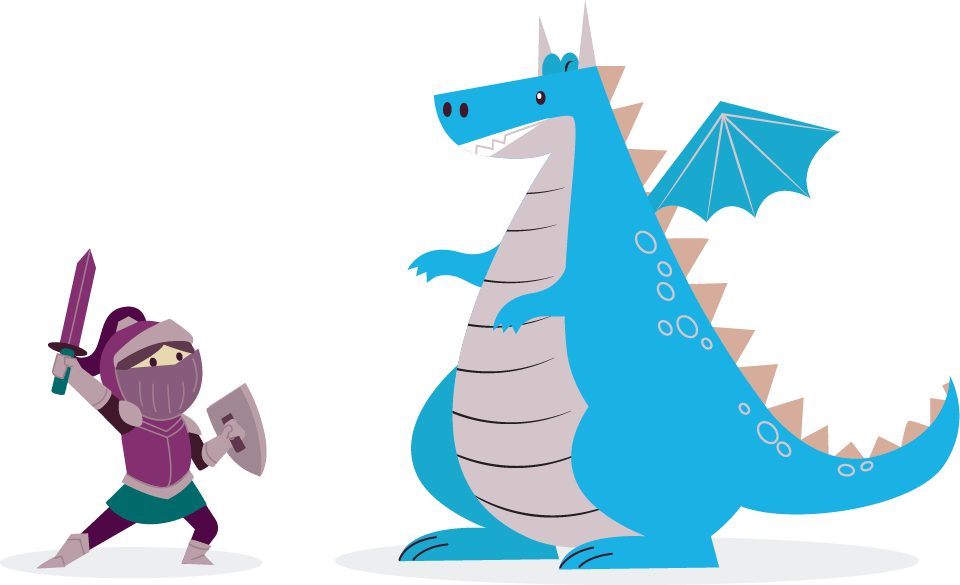
Introduction
In the wide world of customer relationship management (CRM), how does Odoo compare to the CRM giant, Salesforce?
Both software companies have seen a steady increase in users since their inception, as more and more businesses have been realizing the benefits of managing their customer-related operations using software platforms. While Salesforce is an older and larger company overall, with average yearly revenue growth of about 27% since 2013 [1], Odoo, being a newer and less well-known company has held consistent revenue growth above 50% over the last ten years [2]. The rapid growth of both companies can be attributed to the growing popularity of SaaS software, which includes the use of CRMs.
CRM software provides a centralized database for customer information, making it easy for teams to collaborate and ensure that data and reporting information are accurate. It also provides specialized tools for task automation, lead generation, and lead nurturing to help salespeople find and retain customers—helping to make sales teams more productive overall.
Having effective customer management software is also key to providing excellent customer service. Customers today care more than ever about a business's ability to provide a positive sales experience and meet all of their needs in a timely manner.
With customer service becoming increasingly important, and CRM software becoming increasingly relevant for businesses to effectively organize their customer data and sales workflows, the question arises: which CRM software should you choose for your business?
Two options, Odoo and Salesforce, share many of the same CRM capabilities, including cloud hosting and storage, task and team management, team and customer communication channels (including email integrations), sales software integration, lead generation tools, and automated data, reporting, and analytics.
All of Odoo's CRM capabilities are included with the Standard edition, while some of Salesforce's corresponding capabilities require an upgrade (from Professional to Enterprise edition) or other add-ons. Overall, while both companies provide powerful CRM solutions, Odoo's pricing structure is more affordable, making it more accessible to SMBs.
In addition, Odoo is an enterprise resource planning (ERP) software, meaning it offers integrated capabilities beyond the scope of a single-use application, such as a CRM.
CRM Overview
Definition of CRM
Customer relationship management (CRM) refers to the practices that businesses use to manage customer data and handle interactions with current and prospective customers. "CRM" is commonly used in reference to CRM software—technology that helps businesses organize and analyze customer information, communicate with colleagues and customers, and manage sales workflows—all for the purpose of fostering better customer relationships.
CRM software tracks every interaction that a business has with a customer—from ad clicks and website visits to phone calls with salespeople—and makes this information readily available to employees, giving businesses a full 360-degree view of the customer story and allowing them to provide informed, personalized, and comprehensive service. CRM software also serves as a platform to effectively collaborate with colleagues using shared information, and it even provides automation tools to help salespeople get work done faster.
Benefits of Using CRM Software
Centralized Information
CRM software provides a centralized database for customer information. Everyone in the company who deals with customers can access the same database and update information in the database as needed. Data is organized in the CRM to make it easy for users to find, add, or edit information.
"CRMs automatically organize data, share customer interactions, and minimize the risk of duplicative work."
When multiple employees work with a single customer, the employees share a unified record of every interaction between the customer and the company—including automated emails and follow-ups. This allows every employee to provide informed service without relying on customers or colleagues to explain or repeat information. In addition, work can continue even when one employee is absent.
Because data is automatically organized, customer interactions are shared, and the risk of duplicative work is minimized by using a CRM, better customer service outcomes become possible. This directly contributes to more sales (in overall volume), increased average order values (via upsells and repeat customer purchases), and increased customer lifetime value (CLV).
Furthermore, most CRM software also organizes information into reports to help businesses analyze sales and marketing performance. CRM reporting tools automatically collect data from sales, leads, and opportunity progression through the variety of customer experiences a business may offer. CRMs can instantly arrange this data into pivot tables, graphs, and spreadsheets, and organize the data by date, location, and much more. Since the data is sourced directly from the CRM database itself, it is guaranteed to be comprehensive and accurate, and every team has the same data to work with. Accurate data collection and data reporting are especially useful in today's digital landscape, where advertising and user privacy data have become increasingly complex to track, and lead attribution is often mixed or missing entirely.
Streamlined Workflow
Another huge benefit of using CRM software is that it automates administrative tasks—everything from following up with customers and scheduling meetings with colleagues, to sending confirmation emails and logging correspondence. Automating these tasks, or otherwise making them very easy to do, frees up employees' time to focus on other tasks and removes the costs and bureaucracy associated with administrative work.
In addition, CRMs are now using artificial intelligence (AI) to automate tasks like lead scoring, which helps salespeople decide which leads to prioritize based on probability scores that pull from a variety of factors. This type of intelligent automation helps people work faster and smarter, as the opportunities that have the highest chance of success are identified and pursued first.
"Intelligent automation helps people work faster and smarter."
Better Customer Relationships
CRM software provides built-in tools that help businesses find new customers and nurture existing relationships. Lead generation technology finds and records the contact information of prospective customers so that businesses can turn those prospects into new business opportunities. For example, Odoo generates leads from visits to a company website. Often, CRMs also integrate with marketing technology to track leads from marketing campaigns and to quickly identify quality prospects.
In addition to lead generation, CRM platforms are also built with lead nurturing tools—such as condition-specific autoresponders that immediately follow up with customers and prospects if they fulfill certain qualifying criteria, or activity scheduling to remind teams to follow up with active leads. Depending on the particular software, CRMs may also provide tools for salespeople to quickly create and send quotations, invoices, and other essential documents to customers—such as quotation templates, draft invoices, and subscription plans
"CRMs are built with lead generation and lead nurturing tools."
Improved Financial Outcomes
CRM software is statistically proven to benefit businesses financially. In 2014, the average return on investment (ROI) on CRM technology was $8.71 for each dollar spent [3]. And this number has certainly increased since then with continual developments in CRM technology that have made the software more robust and capable—such as embedded analytics and AI-powered features [3].
In addition, CRM applications have been shown to help businesses increase sales by up to 29% and increase sales productivity by up to 34% [4]. With a CRM, salespeople can keep track of every lead, scheduled call, and client customization, and companies that use CRM systems have benefited from a 17% increase in lead conversions and a 16% boost in customer retention [5]. These companies have also seen a 21% improvement in productivity for individual employees [5]. CRM software often integrates with email, VoIP, messaging apps, and other communication systems, and offers numerous automation features, all of which improve productivity. Finally, CRM software provides a centralized and accessible database for company information, and it has been shown that data accessibility shortens the sales cycle by an average of 8-14% [6].
CRM Software Market Analysis
Market Performance and Forecast
CRM software is a popular and fast-growing industry worldwide. The global CRM market size has grown by an average of 11.6% per year between 2017 and 2022 [7]. It is projected to grow from $79.4 billion in 2023 to $131.9 billion by 2028, at a compound annual growth rate (CAGR) of 10.7% during the forecast period [8].
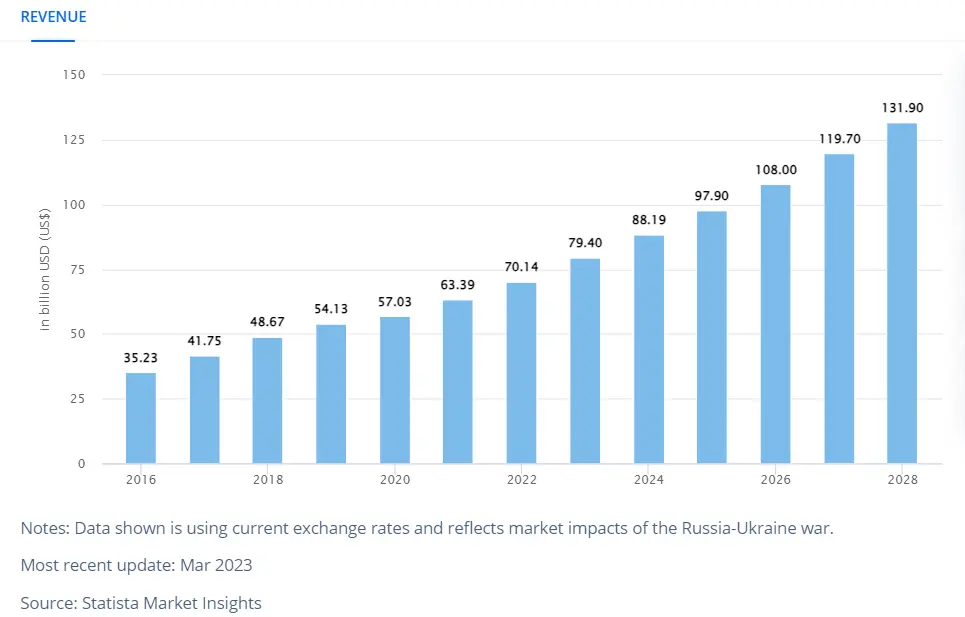
In 2021, it was estimated that over 91% of companies with more than 11 employees were using CRM systems [9].
Market Catalysts
A main factor driving the steady increase in the adoption of CRM software is the rising importance of customer satisfaction. In 2021, it was estimated that over 65% of buyers had higher expectations for customer service than they did 3-5 years prior [10]. For instance, 71% of customers expect a business to share information between employees so the customer does not need to repeat themselves [11]. 78% of consumers said that good customer service is fundamental to earning their business and loyalty, and 90% said they are willing to spend more money with companies that provide personalized customer services [11]. Given the rise in customer expectations and the clear financial benefits of providing good customer service, businesses are prioritizing and investing in their customer service for growth and long-term success. CRM software is the key tool that helps businesses provide informed and personalized services to their customers.
Another catalyst of the CRM market is businesses gaining customers [12]. As businesses grow, they have more and more customers to manage, and a CRM becomes increasingly vital for storing large amounts of information and providing quality customer service. CRM software makes it easy for businesses to scale as they grow their customer base.
"CRM software is the key tool that helps businesses provide informed and personalized services to their customers."
Odoo vs. Salesforce
Background
Salesforce is a long-standing CRM software and the current global leader (by market share) in the CRM applications market. Founded in 1999 in San Francisco, California, with the goal of being "A World-Class Internet Company for Sales Force Automation," Salesforce quickly grew into one of the world's leading companies for sales management software. The company offers a number of integrated apps called "Clouds" (e.g. Sales Cloud, Marketing Cloud) that offer certain features according to a business's needs, as well as apps specifically for AI integrations (e.g. Mulesoft, Einstein), and additional apps that function outside of the Salesforce platform (e.g. Slack, Tableau). Salesforce is known for its cloud-based data storage and AI-driven features.
Comparatively, Odoo is smaller in size, newer, and less renowned than Salesforce. But Odoo is often the choice for small and medium-sized businesses (SMBs) that want the advantages of business management software at an affordable cost. Founded in 2005 in Wallonia, Belgium, with the goal to "lead the enterprise management market with a fully open source software," Odoo makes its software code available online for free, making it very easy for software developers around the world to customize their own Odoo platforms and develop marketplace apps that expand Odoo's capabilities.
"While Salesforce is specifically a CRM, Odoo is an ERP to manage a wider range of business needs."
Odoo also aims to fulfill a wide range of operational needs—not just CRM for sales teams. In fact, Odoo is an enterprise resource planning (ERP) software, meaning it supports the needs of an entire business, so that every department in the company can use the same integrated platform and draw from the same database through a variety of interconnected applications. Odoo offers over 50 in-house apps, including CRM, Sales, Marketing, Manufacturing, Inventory, Accounting, Website, Human Resources, and much more. In this way, Odoo goes beyond the 360-degree view provided by traditional CRMs to offer an even more comprehensive view of a business's entire operations.
So while Salesforce is specifically a CRM—with a focus on managing customer relations, sales, and marketing in particular—Odoo is an ERP to manage a wider range of business needs, which includes a fully-featured and integrated CRM. While Salesforce offers popular CRM add-ons—such as marketing and e-commerce—for additional costs, Odoo offers those applications and more (even those unrelated to CRM, such as Inventory and Accounting) for no additional cost. Ultimately, Odoo and Salesforce share similar CRM functionality and user interface options (with some key differences), but Odoo offers capabilities beyond CRM.
In addition, Odoo's open-source business model and accessible pricing structure make it more affordable than Salesforce.
Salesforce
Salesforce's Sales Cloud application, which is a direct comparison to Odoo's CRM and Sales applications, is available in 4 editions: Starter, Professional, Enterprise, and Unlimited.

Salesforce is available in four editions, which are all billed annually:
- Starter
- Includes basic CRM, sales, and email marketing services
- For small teams only
- $25 per user, per month
- Professional
- Includes a more advanced CRM suite
- For any size team
- $80 per user, per month
- Enterprise
- Includes a customizable version of the CRM with more automated features
- $165 per user, per month
- Unlimited
- Includes the advanced CRM suite with automation, built-in AI, and developer support
- $330 per user, per month
Depending on the edition, various in-house add-ons are available to augment the Sales Cloud for additional monthly costs. These include specific tools for CPQ (configure, price, quote), billing, and marketing, as well as AI features like Einstein. These add-ons range in price anywhere from a few dollars per user per month to thousands of dollars per month.
Contrastingly, Odoo is available in 3 editions: One App Free, Standard, and Custom.
150k +
paying customers
7k +
apps (in AppExchange)
630 +
resellers
56k +
employees
Odoo
Odoo includes every app with its entire range of features and integrations in the Standard version. This includes all built-in integrations with external providers—such as WhatsApp for messaging customers, Stripe for accepting payments, and FedEx for making deliveries—as well as all AI and automation features.

- One App Free
- Includes 1 Odoo application for free, forever
- For unlimited users
- $0 per user, per month
- Standard
- Includes all in-house Odoo apps (including CRM and Sales)
- $24.90 per user, per month
- Custom
- Includes all in-house Odoo apps plus customizations, multiple companies, and external API
- $37.40 per user, per month
12 million +
monthly users
44k +
apps
5k +
partners
3.6k +
employees
Features Comparison
The following section compares the key CRM features of Odoo Standard edition ($24.90/user/month) and Salesforce Professional edition ($80/user/month). This only includes the features of Odoo's CRM app and the apps directly related to CRM, not those that cover other business needs that are also included in Odoo Standard edition.
While Odoo and Salesforce share many of the same CRM capabilities, Salesforce is missing a number of specific features that Odoo has already built in. There are often options for third-party integrations that lend Salesforce those capabilities—however, each third-party add-on typically comes with a separate cost.
Information Storage
Odoo
Salesforce
Cloud-Based Data Storage
Contact Database
Linked Contacts
Contact enrichment
*
Customer List
Product Catalogue
Internal Notes
Customizable Form Fields
*In-app purchases required
Task Management
Odoo
Salesforce
Customizable Pipeline
Kanban Pipeline
Drag-and-Drop Opportunities in Kanban Pipeline
Activity Scheduling
Activity Triggering
Activity Reminders
Activity Calendar
Leads List
Category Tags
Priority Tags
Predictive Lead Scoring
*
Manual Lead Scoring
*Salesforce Enterprise edition required
Team Management
Odoo
Salesforce
Salesperson Profiles
Sales Teams
Team Pipelines
*
Team Calendars
Sharing Availability
Lead Assignment (Automatic)
Lead Assignment (Manual)
Gamification
*
*Salesforce Enterprise edition required
Customer Communication
Odoo
Salesforce
Conversation History (Chatter)
Direct Messaging/Live Chat
**
Email from Opportunity Page
Confirmation Emails
*
Deliver Documents by Email
**
Email Templates
Document Preview
*
Online Customer Portal
**
VoIP
WhatsApp Integration
*Salesforce Enterprise edition required
**Additional Salesforce services required
Lead Generation
Odoo
Salesforce
Leads from Website Visits
Leads from Contact Forms
Leads from Campaign Ads
Leads from Incoming Emails
Leads from Event Registrations
Leads from Appointment Bookings
**
Lead Mining
*
**
Lead Enrichment
*
**
*In-app purchases required
**Salesforce Enterprise edition required
Sales
Odoo
Salesforce
Quotation Builder
Quotation Templates
Import/Exports Sales Orders
*
Upselling and Cross-Selling
*
Optional Products
*
E-Signature on Quotations
Online Payments
**
Invoice Management from Sales Orders
Delivery Status Visible on Orders
**
Scheduled Delivery Dates
Gift Cards
e-Wallet
Coupons
Promotional Programs
Price Rounding
Pricelists
**
Multiple Prices per Product
**
*In-app purchases required
**Salesforce Enterprise edition required
Reporting
Odoo
Salesforce
Marketing Campaign Tracking
Lead Source Tracking
Reasons for Lost Opportunities
Customizable Reports
Customizable Dashboards
Customizable KPIs
Analytics
*
Order and Invoicing Analysis
Forecast Report
Download as Excel File
Import Spreadsheets
Live Spreadsheets
*
Multiple Graph Options
Pivot Table on Multiple Dimensions
*Additional Salesforce services required
Configuration
Odoo
Salesforce
Multi-User
Different Languages
Supported Countries
80+
100+
Multiple Currencies
Multiple Taxes
Different Types of Access Rights
*
API Access
*
**
*Odoo Custom edition required
*Salesforce Enterprise edition required
Integrations
Odoo
Salesforce
In-House Apps
50+
10+
Third-Party Apps
10k+
7k+
Gmail
Outlook
Amazon
**
eBay
**
Mail Couriers (FedEx, DHL, etc.)
*
Payment Acquirers (Stripe, etc.)
*Salesforce Enterprise edition required
**Salesforce Enterprise edition required + additional services required
Usability
Odoo
Salesforce
Full Web Interface
Mobile App
Android App
iPhone App
User Interface
Odoo and Salesforce provide much of the same information and options on their respective user interfaces (UIs). But while Salesforce maintains a predominantly blue theme, Odoo uses color to categorize and differentiate information on the page.
Kanban Pipeline
Salesforce
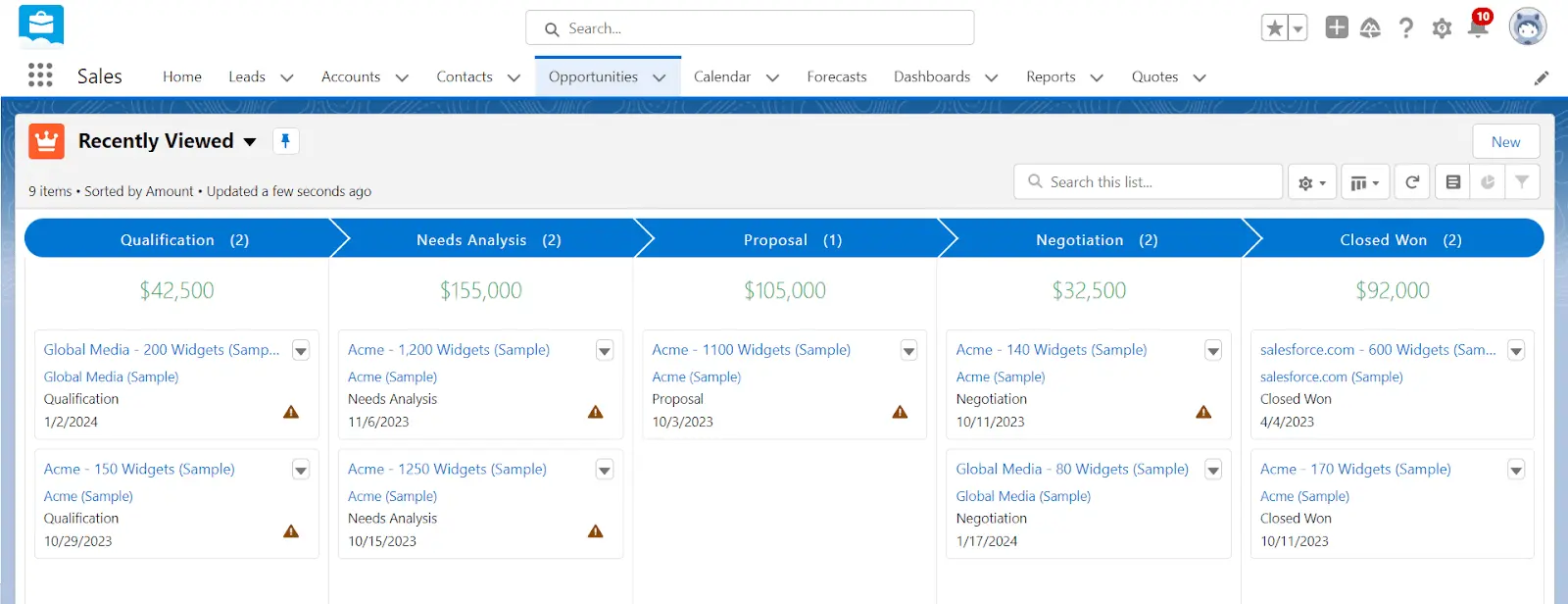
Odoo
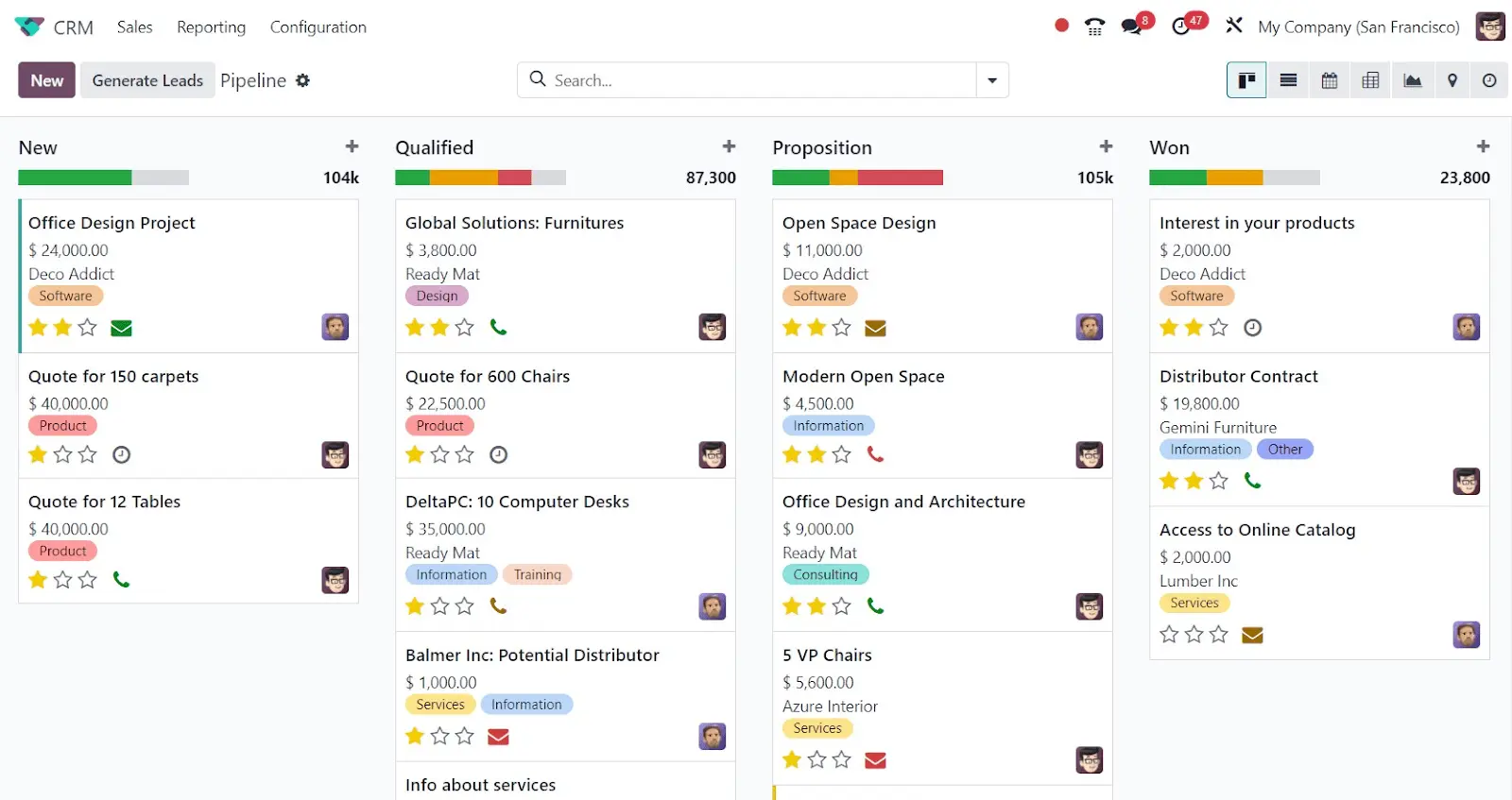
Opportunity Page
Salesforce
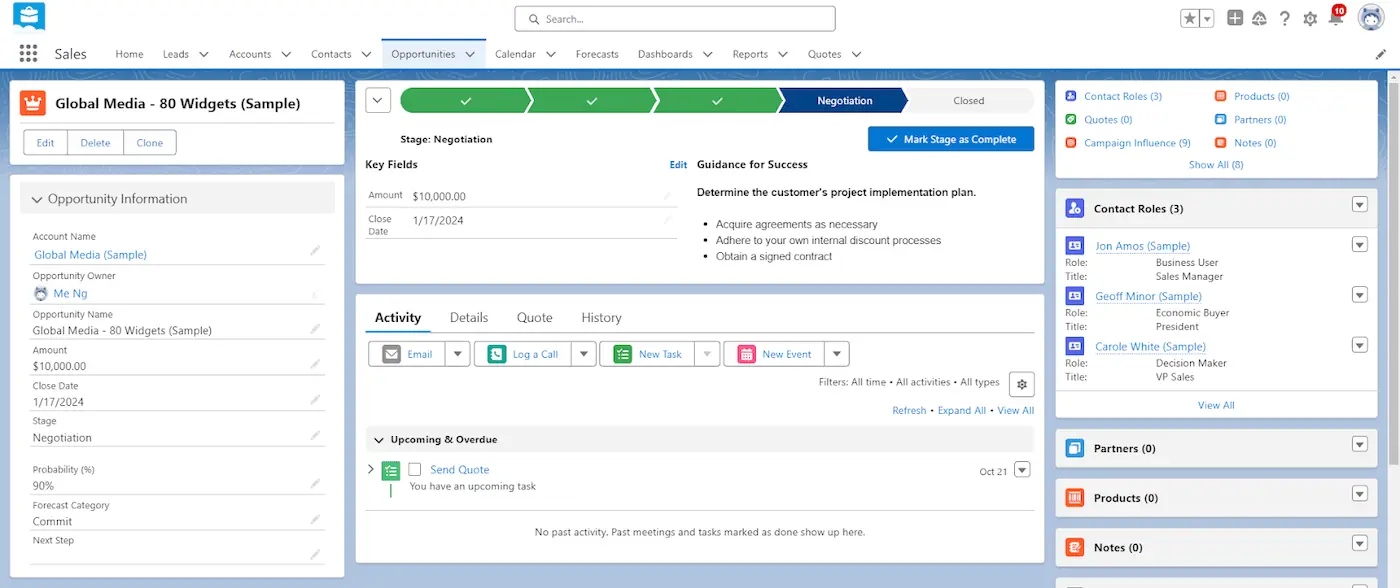
Odoo
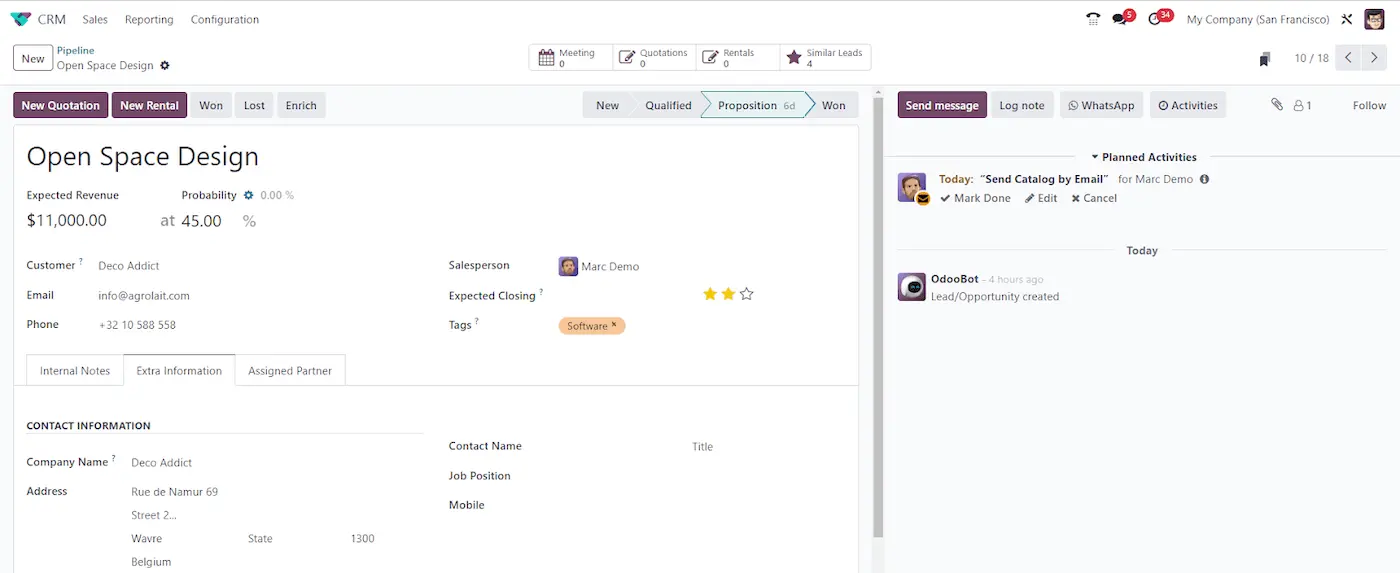
Sales Pipeline Report
Salesforce
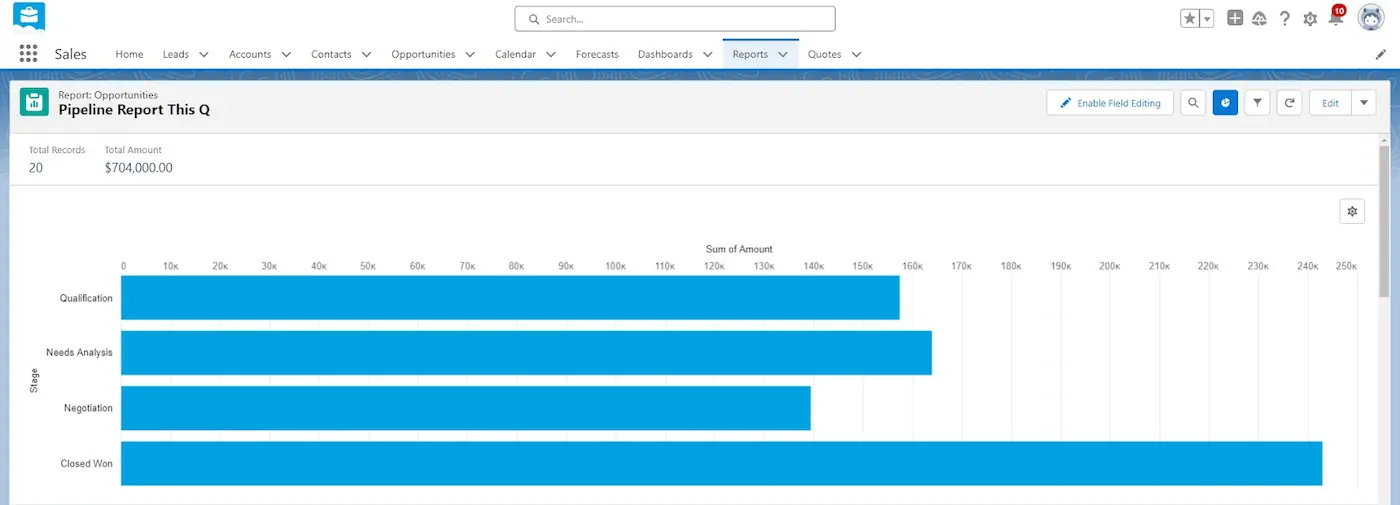
Odoo
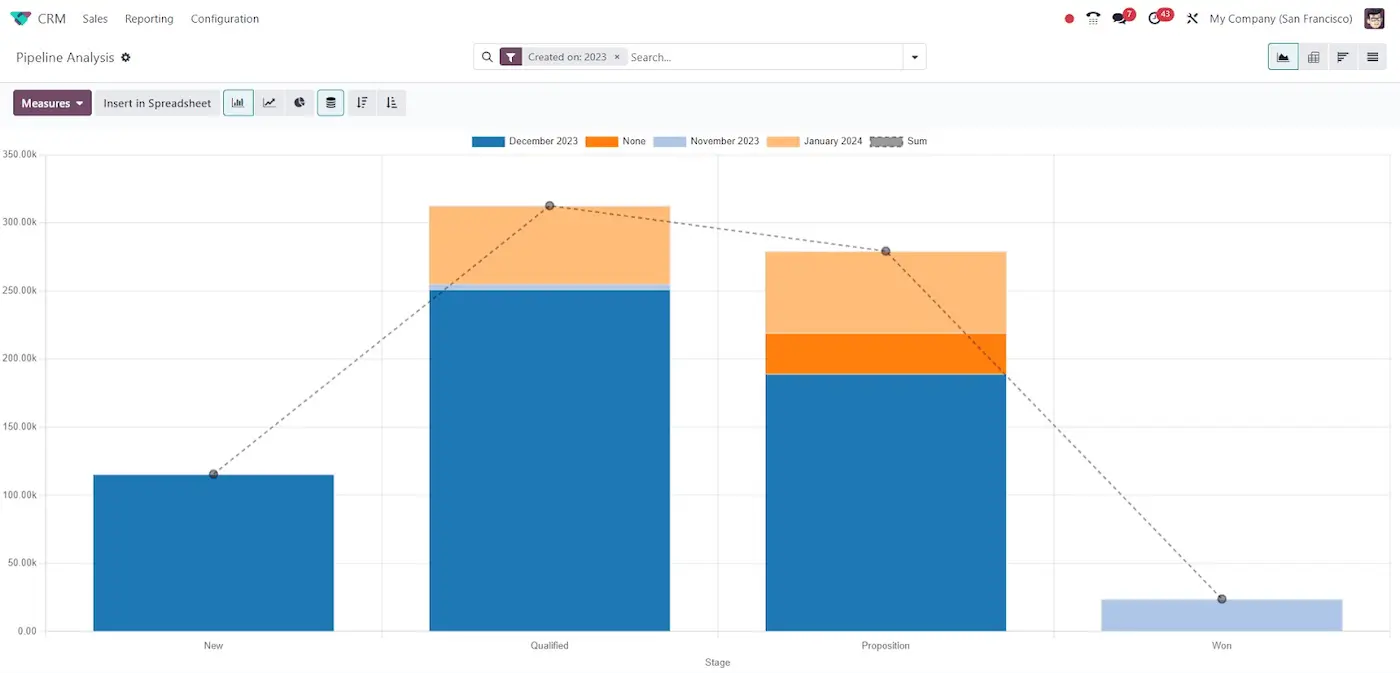
Google Trends
Product Search
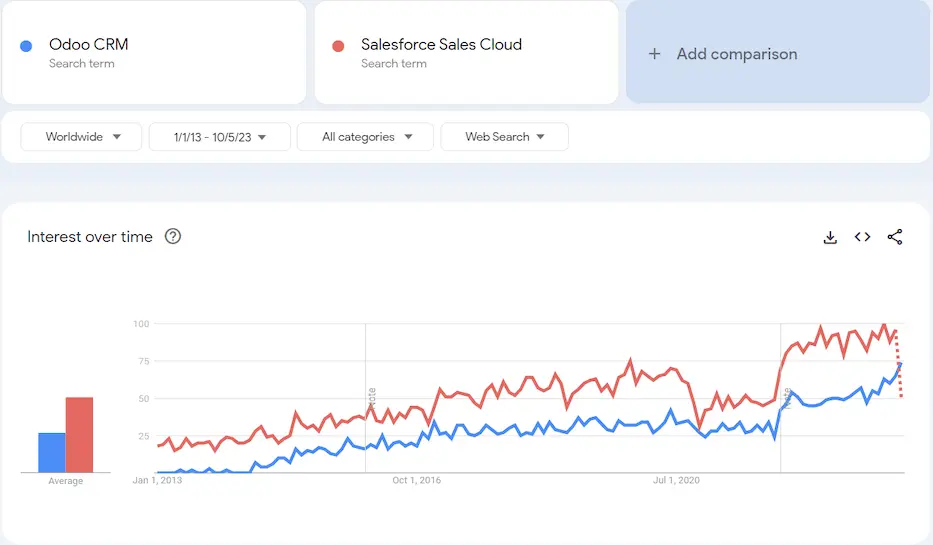
Brand Name Search
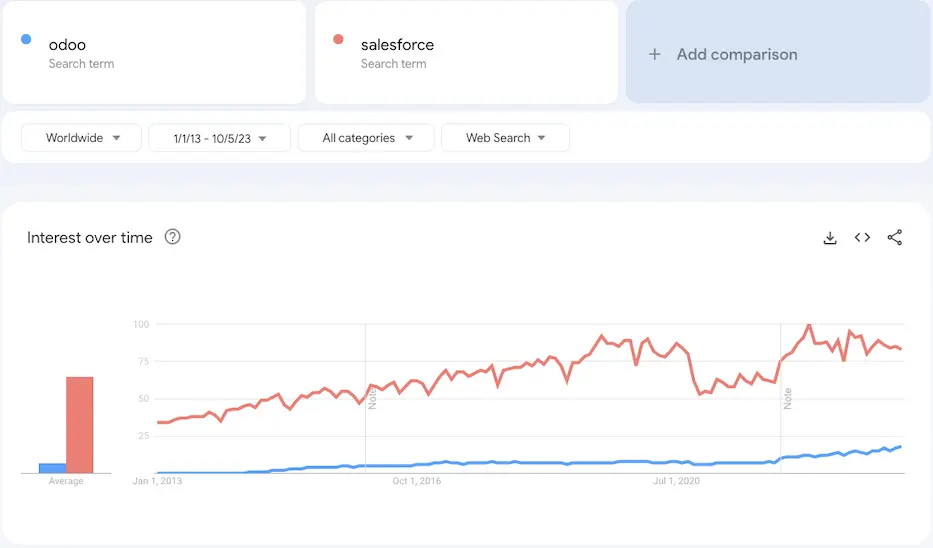
Conclusion
CRM software is an essential tool for any business that wishes to offer a unified sales and marketing database for sales teams. It is proven to help businesses improve their sales outcomes, such as lead conversion rate, along with other valuable revenue-generating metrics, such as customer retention and customer lifetime value. CRM systems provide a centralized database for information, which leads to higher customer retention because teams beyond the initial sales team can access information about the entire customer journey, add to it, and benefit from a centralized view of everything that happens after the sale has been won. CRMs also drive employee productivity with automated actions to speed up workflow, as well as lead nurturing tools to foster personalized customer relationships.
Despite Salesforce being the dominant competitor, the space for CRM software is still a rapidly growing market. As customer service becomes more important to buyers, it also becomes more important for businesses to prioritize in order to grow and retain happy customers. CRM software is a proven tool to help businesses create smoother, easier workflows for employees based on shared customer information, resulting in positive customer interactions at every step of the sales process. Naturally, more and more businesses are opting to use CRM software for their day-to-day business needs.
As far as choosing the right CRM for your company, both Odoo and Salesforce provide excellent tools for organizing information, managing teams, communicating with customers, finding leads, making sales, and analyzing data. Both software systems also have a vast marketplace of custom apps, add-ons, and integrations (although these often come with additional costs). From a CRM perspective, the two software systems offer similar capabilities and user experience, with Odoo's pricing structure making it more affordable than Salesforce.
However, Salesforce is a sales-focused CRM, while Odoo is an ERP. For no additional cost, Odoo offers capabilities far beyond CRM that still work in sync with the CRM app. Businesses can track their entire sales flow through Odoo, providing personalized customer experiences not only through the initial sale, but also through payment, support, delivery, and follow-up. Odoo's marketing apps provide metrics on which campaigns are driving not just sales but profitable customer relationships, taking into account payment history, support needs, and more. Other departments can leverage this insight, so the supply chain and product development teams drive decisions based on customer demand. Odoo CRM also syncs with the Events and Website apps to generate leads from online appointments, event registrations, and website contact pages.
Overall, while Odoo and Salesforce offer similar CRM features, Odoo's capabilities reach beyond CRM to cover the comprehensive operations of an entire business.
This whitepaper was compiled by Odoo Inc. We did our best to make it objective and fair. If you find a mistake or a missing feature, please report it to growth@mail.odoo.com and we will update this document. Our goal is to have a continuously updated comparison of the main competitors to be as accurate as possible.
References
- [1] Salesforce Revenue. Stock Analysis.
- [2] (2021, April 20). Odoo Records Unstoppable Growth. PRNewswire.
- [3] (2014, June). CRM Pays Back $8.71 For Every Dollar Spent. Nucleus Research.
- [4] Howard, Margot. (2023, August 21). 17 CRM stats that sales professionals need to know. Nutshell.
- [5] Karr, Douglas. (2023, September 7). CRM Statistics: The Uses, Benefits & Challenges of Customer Relationship Management Platforms. Martech Zone.
- [6] (2015, August 11). Data accessibility for sales teams shortens the sales cycle. Nucleus Research.
- [7] (2023, November 15). CRM System Providers in the US - Market Size (2005-2029). IBIS World.
- [8] Customer Relationship Management Software - Worldwide. Statista.
- [9] Customer Relationship Management (CRM) Market Size, Share & COVID-19 Impact Analysis, By Component (Software and Services), By Deployment (On-Premises and Cloud), By Enterprise Size (Large Enterprises and SMEs), By Application (Marketing and Sales Automation, Customer Management, Lead Generation & Customer Retention, Customer Support and Contact Center, CRM Analytics, and Social Media Management), By Vertical (BFSI, Manufacturing, IT & Telecommunications, Retail & Consumer Goods, Government, Healthcare, Transportation and Logistics, and Others), and Regional Forecasts, 2023-2030. Fortune Business Insights.
- [10] The Netomi Pulse Report State of Customer Service in 2021. Netomi.
- [11] (2023, May 30). 2023 Customer Service Statistics. 123 Form Builder.
- [12] (2023, January). CRM Software Global Market Report 2023. The Business Research Company.
